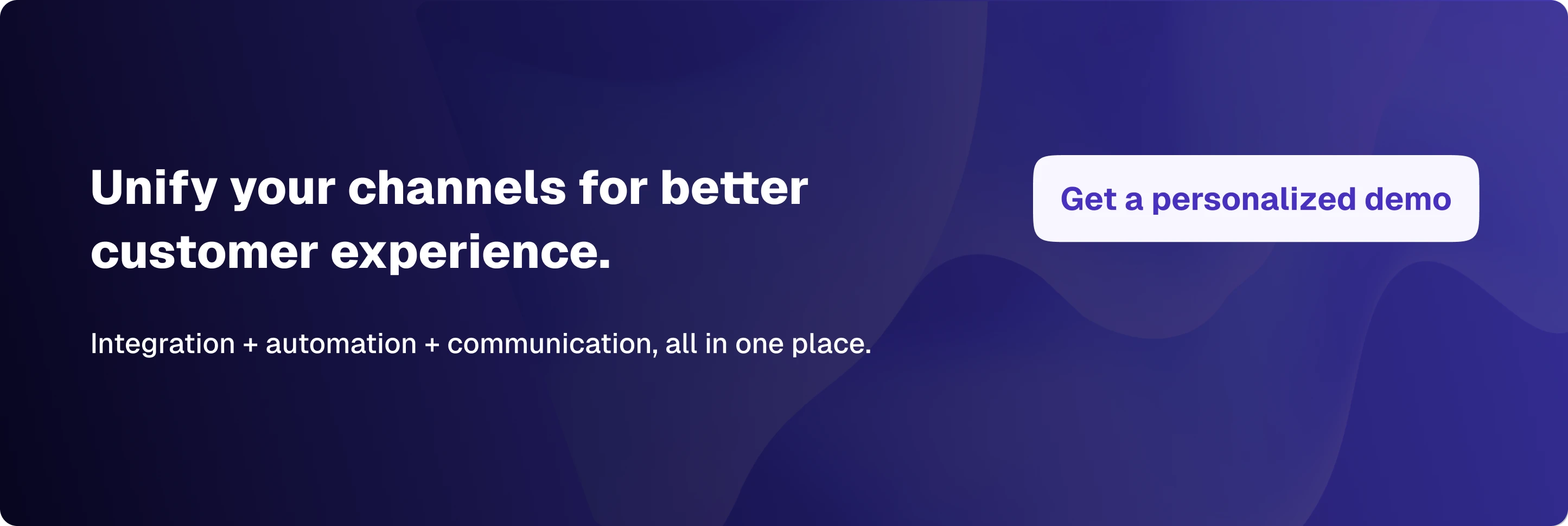AI Agent for Enterprise Support: Scale Efficiently, Delight Customers, and Cut Costs
In today’s fast-paced, competitive business world, delivering exceptional customer and employee support at scale isn’t just a nice-to-have; it’s essential. Enterprises face rising customer expectations, growing request volumes, and the constant challenge of maintaining quality while keeping costs in check. According to McKinsey, fewer than 10% of North American customer care executives felt their 2024 performance exceeded expectations. The pressure is intense, and the risks are real: one poor support experience can cost thousands in lost revenue and damage trust that took years to build.

That’s where AI-powered agents come in, offering a game-changing solution. These tools don’t just improve support; they transform it, helping businesses scale efficiently, automate complex tasks, and keep customers satisfied. In this guide, we’ll explore the hurdles of scaling enterprise support, show how AI is reshaping the landscape, and how Enjo is powering AI Support Agents that are designed for large-scale success. Backed by insights from Gartner, McKinsey, and Forrester, this post offers practical strategies for support leaders ready to embrace this shift.
The Challenges of Scaling Enterprise Support
Scaling support for a large enterprise is a high-stakes balancing act. Rising demands, overwhelming volumes, consistency, and cost control all need to work together seamlessly. When they don’t, customer loyalty hangs in the balance. Let’s break down the key issues:
1. Skyrocketing Customer Expectations
Customers today expect more than quick answers; they want fast, personalized solutions on every channel. Imagine a user stuck in a loop between departments, only to get a generic reply that doesn’t help. That’s not just frustrating; it’s a breaking point. PwC found that 73% of customers will abandon a brand after one bad experience (2023). With stakes this high, enterprises can’t afford slip-ups.
2. Floods of Requests
Growth brings a surge of inquiries, from basic questions to tricky technical problems. Human teams struggle to keep up, with agents swamped by tickets, rushing replies, and facing burnout. The result? Longer wait times, weaker solutions, and stressed staff. It’s a tough cycle that puts service quality at risk.
3. Keeping Quality Consistent
Managing thousands of daily interactions across email, chat, and phone is a logistical challenge. One agent might give a thorough, helpful response, while another, short on time, sends a vague reply to the same issue. This inconsistency confuses customers and weakens trust. In a world where reliability matters, uneven support can quietly harm a brand.
4. Controlling Costs
Enterprises must deliver great support to keep customers, but costs can spiral quickly. Hiring more staff is expensive, with training and salaries adding up. Cutting corners, though, leads to escalations, lost customers, and a reputation hit that’s even pricier to fix. Traditional methods often fall short of solving this dilemma.
Gartner predicts that by 2025, 80% of B2B sales will move to digital channels, putting more strain on support teams (2024). So, how do you scale without sacrificing quality or overspending? AI holds the answer.
More Reading: 2025 Customer Service Guide

How AI Is Transforming Enterprise Support
AI isn’t just tweaking enterprise support; it’s revolutionizing it. Gone are the days of rigid, scripted chatbots. Today’s generative AI understands context, makes decisions, and delivers service that older tools can’t match. This is a major leap forward.
What Makes Generative AI Different?
Unlike traditional AI with fixed rules, generative AI, like that in Enjo AI Agents, learns from vast datasets such as customer tickets, manuals, and FAQs. It then crafts human-like responses and solves issues on the fly. For example, if a customer asks about a delayed order, the AI checks the status, fixes the problem, and updates them, all without human help. That’s the strength of this technology.
Deloitte’s 2024 report shows that 20% of companies using advanced generative AI see ROI above 30%, cutting costs, speeding up service, and lifting satisfaction (Deloitte, 2024). For support leaders, this means a clear advantage over human-only teams at scale.
Why AI Excels in Support
- Efficiency at Scale: AI handles repetitive tasks like sorting tickets or tracking orders in seconds.
- Reliable Consistency: Every reply meets the same high standard, regardless of volume.
- Lower Costs: Automation reduces the need for large teams, freeing up budget for bigger goals.
- 24/7 Availability: AI keeps support running anytime, anywhere.
TechCrunch puts it well: “AI is your secret weapon in a game where every interaction shapes your reputation” (2024). It’s about reimagining what support can achieve.
The 10-Step Productivity Boost with AI Agents by Enjo
What if you had a playbook to make your support team unstoppable? Better yet, what if AI could take that playbook and turn it into a reality? We’re talking about 10 steps to boost customer support agent productivity, steps that Enjo, doesn’t just follow but amplifies with its AI-powered muscle. Let’s break it down and see how Enjo makes these steps sing for enterprise teams.

The Framework: 10 Steps to Success
These steps, inspired by industry best practices, focus on smarter knowledge management, system integration, and agent empowerment. Enjo takes them to the next level, here’s how.
- Centralize Your Knowledge
- What It Means: A single, reliable source for answers beats scattered docs any day.
- Enjo’s Edge: The AI Answers feature builds a centralized knowledge hub from yourtickets, manuals, and more. Agents don’t waste time hunting answers come to them. A 2024 Zendesk report notes that teams with centralizedknowledge cut resolution times by 25%. With Enjo, that’s not a goal it’s a given.
- Organize Knowledge Intuitively
- What It Means: Logical structure means faster access.
- Enjo’s Edge: The AI Agent Studio thrives on well-organized data, training AI todeliver precise responses. Think of it as a librarian who never sleeps,sorting your chaos into clarity.
- Integrate Knowledge Into All Systems
- What It Means: No more app-hopping for answers.
- Enjo’s Edge: AI Ticketing and Agent Assist embed smarts into tools like Jira andZendesk. A 2025 Gartner prediction says 80% of support teams will relyon integrated AI by year-end. Enjo’s already there, keeping agents inthe flow.
- Avoid Overloading Agents with Too Much Knowledge
- What It Means: Less clutter, more focus.
- Enjo’s Edge: AI filters what’s relevant, serving up bite-sized insights via Agent Assist. HubSpot’s 2024 data shows 64% of agents say AI reduces overwhelm.
- Include Modern Search Functionality
- What It Means: Find answers fast, not furiously.
- Enjo’s Edge: AI-driven search outpaces manual digging, delivering results in seconds.
- Encourage the Use of Bookmarks and Shortcuts
- What It Means: Quick access to frequent fixes.
- Enjo’s Edge: Insights flags hot topics, letting managers create shortcuts. It’s like giving agents a cheat sheet that updates itself.
- Keep Agents Informed About Content Changes
- What It Means: No stale info, no surprises.
- Enjo’s Edge: When knowledge updates, Enjo retrains its AI and nudges agents via Slack or Teams. Fresh info, fresh wins.
- Leverage Voice Data for Contextual Insights
- What It Means: Understand tone and context beyond text.
- Enjo’s Edge: While text-focused, Enjo’s ticketing integrations can pull voice data insights, adding depth.
- Implement Decision Trees for Complex Issues
- What It Means: Guide agents through tough calls.
- Enjo’s Edge: AI acts as a virtual flowchart, suggesting steps based on past cases.
- Simplify Feedback Loops
- What It Means: Learn and improve, fast.
Enjo’s Edge: Insights and Helpdesk Assessment turn ticket patterns into action plans—think FAQs on autopilot.
When you pair a solid productivity playbook with Enjo’s AI firepower, it’s not just a tweak to your support operation - it’s a transformation. For mid-to-large enterprises, where every minute and dollar counts, this combo delivers results that hit the bottom line and the morale meter. Let’s unpack why IT, HR, and customer service leaders should care.

The Payoff: Tangible Wins for Enterprises
Here’s what happens when Enjo supercharges those 10 steps:
- Efficiency That Sticks: Faster resolutions are the name of the game. Enjo’s AI agents handle routine tickets - those 40% of IT repeats flagged by Gartner leaving agents free for the tough stuff.
- Cost Savings That Add Up: Automation slashes overtime and staffing needs. Cutting 1.2 hours ofdaily grunt work could save a 50-agent team $1.2 million annually, based on average US support salaries of $50,000 from the BLS.
- Scalability Without Sweat: Growing pains? Not here. Enjo scales with demand, no extra headcount needed. Forrester predicts 65% of enterprises will lean on AI for scalable support by 2026.
- Data That Drives Decisions: Insights and Helpdesk Assessment turn ticket chaos into actionable intel—spot trends, fix bottlenecks, repeat. 70% of top-performing support teams use AI analytics by 2025.
Here’s a stat to chew on: Companies adopting AI support automation see a 15% drop in operational costs within a year. For an enterprise spending $10 million on support, that’s $1.5 million back in the bank enough to make any CFO do a happy dance. And unlike some lightweight AI add-ons from helpdesk vendors, Enjo’s built for the big leagues, integrating deep and delivering broad.
Read in detail How Customer Service Helps your Business
What’s Next for AI in Support
The AI shift is speeding up. Here’s what’s on the horizon:
1. Huge Cost Savings: Gartner forecasts that conversational AI will cut contact centre costs by $80 billion by 2025 (2024). That’s a major reset for leaner operations.
2. Tailored Experiences: McKinsey notes that generative AI can personalize millions of interactions, making every customer feel valued (2024). It’s a new level of connection.
3. Widespread Adoption: Forrester sees AI dominating support in retail, finance, healthcare, and beyond, streamlining workflows effortlessly (2024).
4. Cutting-Edge Advances: Better language processing will make AI feel even more human, while augmented reality integrations could redefine support. Ethical issues like privacy will need care, but the possibilities are vast.
For leaders, this is a now-or-never moment. Tools like Enjo are leading the charge.

Here's what to expect going forward in trends when it comes to AI Support Agents
Get Started with Enjo AI
Scaling support shouldn’t mean chaos or overspending. Enjo AI Agents combine efficiency, precision, and scalability into one powerful package. Don’t lag behind competitors; act today:
- Try for Free: Explore Enjo at no cost.
- Book a Demo: See it tailored to your needs.
- Start a Pilot: Launch a low-risk test run.
Conclusion: Scale Smart, Start Now
With rising expectations and tight budgets, AI-powered support is your advantage. Platforms like Enjo let you deliver exceptional experiences at scale, save expenses, and stay flexible. The evidence is clear, the tech is ready, and time’s running out.

That’s where AI-powered agents come in, offering a game-changing solution. These tools don’t just improve support; they transform it, helping businesses scale efficiently, automate complex tasks, and keep customers satisfied. In this guide, we’ll explore the hurdles of scaling enterprise support, show how AI is reshaping the landscape, and how Enjo is powering AI Support Agents that are designed for large-scale success. Backed by insights from Gartner, McKinsey, and Forrester, this post offers practical strategies for support leaders ready to embrace this shift.
The Challenges of Scaling Enterprise Support
Scaling support for a large enterprise is a high-stakes balancing act. Rising demands, overwhelming volumes, consistency, and cost control all need to work together seamlessly. When they don’t, customer loyalty hangs in the balance. Let’s break down the key issues:
1. Skyrocketing Customer Expectations
Customers today expect more than quick answers; they want fast, personalized solutions on every channel. Imagine a user stuck in a loop between departments, only to get a generic reply that doesn’t help. That’s not just frustrating; it’s a breaking point. PwC found that 73% of customers will abandon a brand after one bad experience (2023). With stakes this high, enterprises can’t afford slip-ups.
2. Floods of Requests
Growth brings a surge of inquiries, from basic questions to tricky technical problems. Human teams struggle to keep up, with agents swamped by tickets, rushing replies, and facing burnout. The result? Longer wait times, weaker solutions, and stressed staff. It’s a tough cycle that puts service quality at risk.
3. Keeping Quality Consistent
Managing thousands of daily interactions across email, chat, and phone is a logistical challenge. One agent might give a thorough, helpful response, while another, short on time, sends a vague reply to the same issue. This inconsistency confuses customers and weakens trust. In a world where reliability matters, uneven support can quietly harm a brand.
4. Controlling Costs
Enterprises must deliver great support to keep customers, but costs can spiral quickly. Hiring more staff is expensive, with training and salaries adding up. Cutting corners, though, leads to escalations, lost customers, and a reputation hit that’s even pricier to fix. Traditional methods often fall short of solving this dilemma.
Gartner predicts that by 2025, 80% of B2B sales will move to digital channels, putting more strain on support teams (2024). So, how do you scale without sacrificing quality or overspending? AI holds the answer.
More Reading: 2025 Customer Service Guide

How AI Is Transforming Enterprise Support
AI isn’t just tweaking enterprise support; it’s revolutionizing it. Gone are the days of rigid, scripted chatbots. Today’s generative AI understands context, makes decisions, and delivers service that older tools can’t match. This is a major leap forward.
What Makes Generative AI Different?
Unlike traditional AI with fixed rules, generative AI, like that in Enjo AI Agents, learns from vast datasets such as customer tickets, manuals, and FAQs. It then crafts human-like responses and solves issues on the fly. For example, if a customer asks about a delayed order, the AI checks the status, fixes the problem, and updates them, all without human help. That’s the strength of this technology.
Deloitte’s 2024 report shows that 20% of companies using advanced generative AI see ROI above 30%, cutting costs, speeding up service, and lifting satisfaction (Deloitte, 2024). For support leaders, this means a clear advantage over human-only teams at scale.
Why AI Excels in Support
- Efficiency at Scale: AI handles repetitive tasks like sorting tickets or tracking orders in seconds.
- Reliable Consistency: Every reply meets the same high standard, regardless of volume.
- Lower Costs: Automation reduces the need for large teams, freeing up budget for bigger goals.
- 24/7 Availability: AI keeps support running anytime, anywhere.
TechCrunch puts it well: “AI is your secret weapon in a game where every interaction shapes your reputation” (2024). It’s about reimagining what support can achieve.
The 10-Step Productivity Boost with AI Agents by Enjo
What if you had a playbook to make your support team unstoppable? Better yet, what if AI could take that playbook and turn it into a reality? We’re talking about 10 steps to boost customer support agent productivity, steps that Enjo, doesn’t just follow but amplifies with its AI-powered muscle. Let’s break it down and see how Enjo makes these steps sing for enterprise teams.

The Framework: 10 Steps to Success
These steps, inspired by industry best practices, focus on smarter knowledge management, system integration, and agent empowerment. Enjo takes them to the next level, here’s how.
- Centralize Your Knowledge
- What It Means: A single, reliable source for answers beats scattered docs any day.
- Enjo’s Edge: The AI Answers feature builds a centralized knowledge hub from yourtickets, manuals, and more. Agents don’t waste time hunting answers come to them. A 2024 Zendesk report notes that teams with centralizedknowledge cut resolution times by 25%. With Enjo, that’s not a goal it’s a given.
- Organize Knowledge Intuitively
- What It Means: Logical structure means faster access.
- Enjo’s Edge: The AI Agent Studio thrives on well-organized data, training AI todeliver precise responses. Think of it as a librarian who never sleeps,sorting your chaos into clarity.
- Integrate Knowledge Into All Systems
- What It Means: No more app-hopping for answers.
- Enjo’s Edge: AI Ticketing and Agent Assist embed smarts into tools like Jira andZendesk. A 2025 Gartner prediction says 80% of support teams will relyon integrated AI by year-end. Enjo’s already there, keeping agents inthe flow.
- Avoid Overloading Agents with Too Much Knowledge
- What It Means: Less clutter, more focus.
- Enjo’s Edge: AI filters what’s relevant, serving up bite-sized insights via Agent Assist. HubSpot’s 2024 data shows 64% of agents say AI reduces overwhelm.
- Include Modern Search Functionality
- What It Means: Find answers fast, not furiously.
- Enjo’s Edge: AI-driven search outpaces manual digging, delivering results in seconds.
- Encourage the Use of Bookmarks and Shortcuts
- What It Means: Quick access to frequent fixes.
- Enjo’s Edge: Insights flags hot topics, letting managers create shortcuts. It’s like giving agents a cheat sheet that updates itself.
- Keep Agents Informed About Content Changes
- What It Means: No stale info, no surprises.
- Enjo’s Edge: When knowledge updates, Enjo retrains its AI and nudges agents via Slack or Teams. Fresh info, fresh wins.
- Leverage Voice Data for Contextual Insights
- What It Means: Understand tone and context beyond text.
- Enjo’s Edge: While text-focused, Enjo’s ticketing integrations can pull voice data insights, adding depth.
- Implement Decision Trees for Complex Issues
- What It Means: Guide agents through tough calls.
- Enjo’s Edge: AI acts as a virtual flowchart, suggesting steps based on past cases.
- Simplify Feedback Loops
- What It Means: Learn and improve, fast.
Enjo’s Edge: Insights and Helpdesk Assessment turn ticket patterns into action plans—think FAQs on autopilot.
When you pair a solid productivity playbook with Enjo’s AI firepower, it’s not just a tweak to your support operation - it’s a transformation. For mid-to-large enterprises, where every minute and dollar counts, this combo delivers results that hit the bottom line and the morale meter. Let’s unpack why IT, HR, and customer service leaders should care.

The Payoff: Tangible Wins for Enterprises
Here’s what happens when Enjo supercharges those 10 steps:
- Efficiency That Sticks: Faster resolutions are the name of the game. Enjo’s AI agents handle routine tickets - those 40% of IT repeats flagged by Gartner leaving agents free for the tough stuff.
- Cost Savings That Add Up: Automation slashes overtime and staffing needs. Cutting 1.2 hours ofdaily grunt work could save a 50-agent team $1.2 million annually, based on average US support salaries of $50,000 from the BLS.
- Scalability Without Sweat: Growing pains? Not here. Enjo scales with demand, no extra headcount needed. Forrester predicts 65% of enterprises will lean on AI for scalable support by 2026.
- Data That Drives Decisions: Insights and Helpdesk Assessment turn ticket chaos into actionable intel—spot trends, fix bottlenecks, repeat. 70% of top-performing support teams use AI analytics by 2025.
Here’s a stat to chew on: Companies adopting AI support automation see a 15% drop in operational costs within a year. For an enterprise spending $10 million on support, that’s $1.5 million back in the bank enough to make any CFO do a happy dance. And unlike some lightweight AI add-ons from helpdesk vendors, Enjo’s built for the big leagues, integrating deep and delivering broad.
Read in detail How Customer Service Helps your Business
What’s Next for AI in Support
The AI shift is speeding up. Here’s what’s on the horizon:
1. Huge Cost Savings: Gartner forecasts that conversational AI will cut contact centre costs by $80 billion by 2025 (2024). That’s a major reset for leaner operations.
2. Tailored Experiences: McKinsey notes that generative AI can personalize millions of interactions, making every customer feel valued (2024). It’s a new level of connection.
3. Widespread Adoption: Forrester sees AI dominating support in retail, finance, healthcare, and beyond, streamlining workflows effortlessly (2024).
4. Cutting-Edge Advances: Better language processing will make AI feel even more human, while augmented reality integrations could redefine support. Ethical issues like privacy will need care, but the possibilities are vast.
For leaders, this is a now-or-never moment. Tools like Enjo are leading the charge.

Here's what to expect going forward in trends when it comes to AI Support Agents
Get Started with Enjo AI
Scaling support shouldn’t mean chaos or overspending. Enjo AI Agents combine efficiency, precision, and scalability into one powerful package. Don’t lag behind competitors; act today:
- Try for Free: Explore Enjo at no cost.
- Book a Demo: See it tailored to your needs.
- Start a Pilot: Launch a low-risk test run.
Conclusion: Scale Smart, Start Now
With rising expectations and tight budgets, AI-powered support is your advantage. Platforms like Enjo let you deliver exceptional experiences at scale, save expenses, and stay flexible. The evidence is clear, the tech is ready, and time’s running out.


Accelerate support with Generative AI


Stay Informed and Inspired














